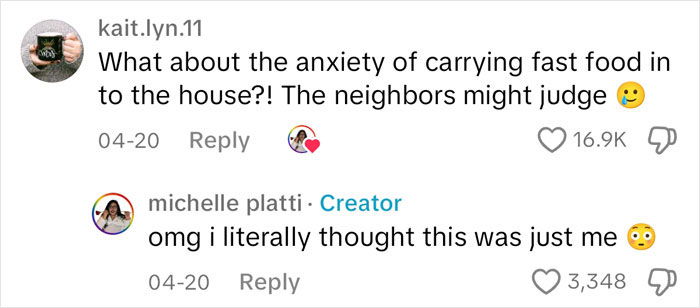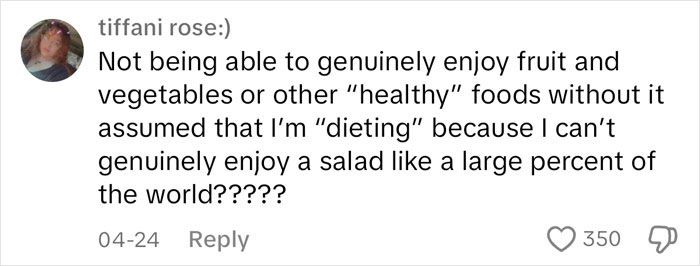Over the past century, the world has made great strides towards equality. Gay marriage is now legal in at least 36 countries, and dozens of nations have had female leaders. But unfortunately, we still have a long way to go in eradicating prejudice from the world, and one of the areas where we have plenty of room for improvement is the realm of body positivity.
The body positivity movement has grown exponentially in recent years, but there’s no question that fatphobia is present in the day to day lives of plus-size people. That’s why content creator Michelle Platti hopped on TikTok to call out all of the things she’s “not allowed” to do as a fat person. Below, you’ll find all of Michelle’s thoughts on this topic, as well as some of the replies she received from viewers.
Fatphobia is still alive and well in modern society
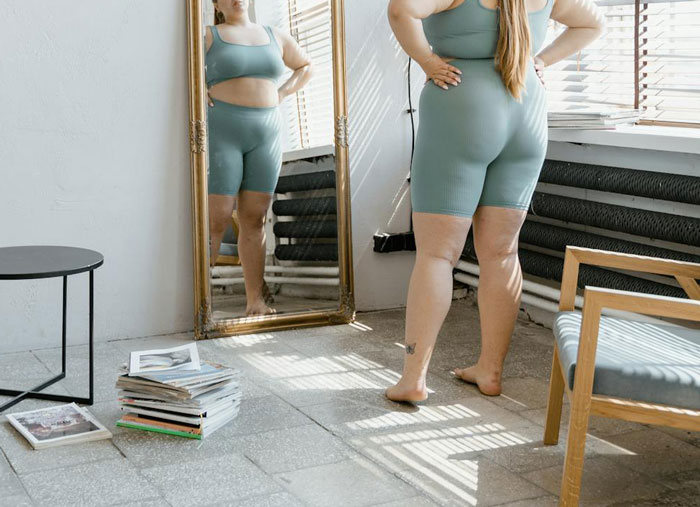
Image credits: MART PRODUCTION / Pexels (not the actual photo)
That’s why this content creator is calling out things she is judged for doing, solely because of her weight
“Let’s talk about some things that I’m not allowed to do because I’m fat. Take that with a grain of salt. I’m not saying I can’t do these things. I’m just saying when I do, I always get some interesting responses.”
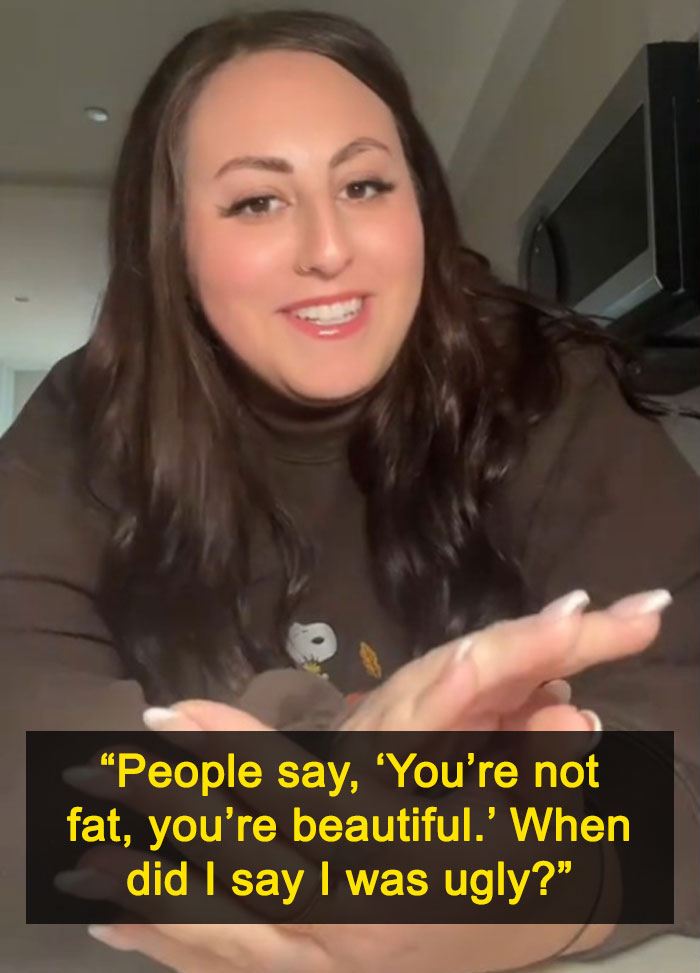
Image credits: michelleplatti
“Starting out strong, if you’re fat, you’re not allowed to say that you’re fat, because people will say, ‘You’re not fat, you’re beautiful.’ Like, when did I say I was ugly? Seriously, fat’s not like, a bad word. It’s just factual, I’m just fat, it’s it’s gonna be okay.”
“I’m never allowed to think that a boy is flirting with me. I’ll have someone actually flirt with me, and I’ll be like, ‘This guy, I feel like is flirting with me,’ and my friend will be like, ‘Really, do you think so?'”

Image credits: michelleplatti
“I’m definitely not allowed to say that I’m hungry first or suggest that we go get food. Um, because clearly I’m so skinny, you only know if I’m fat by me being like, ‘let’s go get food.'”
“I feel like, when you’re fat, you’re not allowed to say that you’re lazy. You can’t be lazy. This really upsets me, because I am lazy. I’m not fat because I’m lazy, or lazy because I’m fat, I just like to sit and rot and watch TikToks. It’s cute and fun when a skinny girl does it and she’s just like ‘self care.’ But when I do, people are like, ‘go to the gym’ or ‘stop eating.'”

Image credits: michelleplatti
“In public I’m honestly not allowed to eat anything. Because if I eat something healthy, like a salad or something, people think, ‘Yeah, right, you want to eat that? Fatty.’ But then if I eat a piece of cake, it’s also like ‘Classic, that’s what we expected.’ There’s no winning.”
“That being said, I also feel like I can’t go to the gym because I feel like I’m being judged at the gym. And I don’t understand that, because it’s like, do you want me to stay fat, or do you want me to not? I just feel like I can’t win here.”
“I feel like I’m not allowed to take the elevator. I still do it because I hate walking up the stairs, which I’m also not allowed to complain about. If a skinny person was out of breath from walking up the stairs, it’s fine. I feel like people are judging me for taking the elevator. They’re like, ‘Of course she’s in the elevator.’ But they’re literally in the elevator too.”

Image credits: michelleplatti
“You’re definitely not allowed to say that you have been compared to a skinny celebrity before. I’ve been told I look like a variety of celebrities. I’ve gotten Rebel Wilson, because she’s fat, Adele, because she was fat, but honestly the way more common ones are Amy Winehouse and Ariana Grande and I feel like I’m not allowed to say them because I’m fat and they’re not.
It’s kind of reminds me of the girl who said that she looked like Megan Fox on Love is Blind. Everyone on the internet was like, ‘She looks like she ate Megan Fox.’ If she was skinny, and she said that, it would have been fine.”
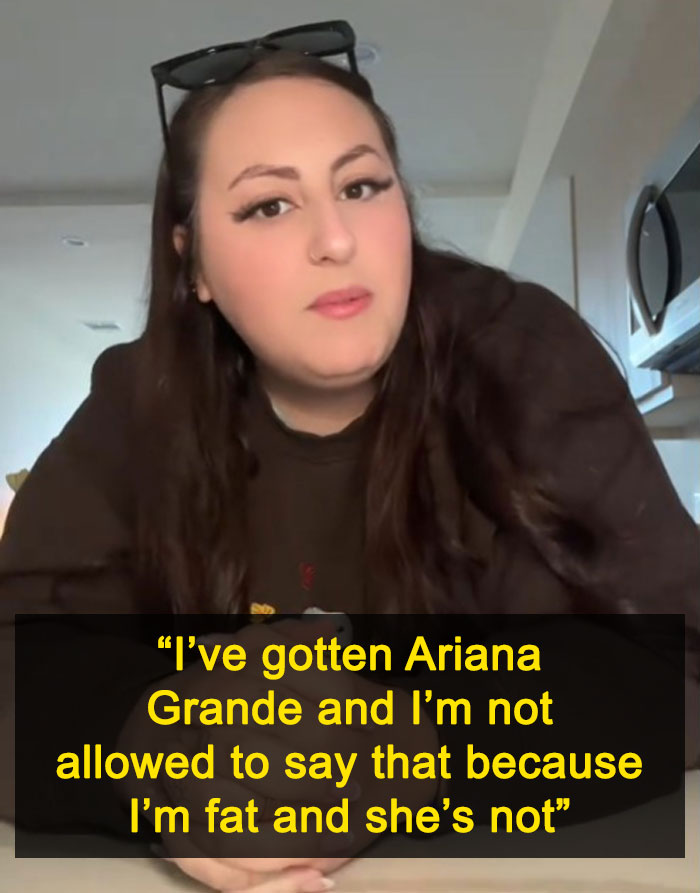
Image credits: michelleplatti
“I’m never allowed to call out fatphobia, because when I do, people get very defensive over it. And I understand, but I also feel like this person did this because of my weight, or you said this because of my weight, and they just don’t get it. It is really irritating, and honestly, it’s worse than the fatphobia itself.”

Image credits: michelleplatti
“I’m never allowed to say that I want dessert first. I feel like I have to go with the flow of the skinny people that I’m with when it comes to dessert. I almost always want a sweet treat, and I feel like I shouldn’t be crucified for that because of my size.”
You can see Michelle’s first video on this topic right here
@michelleplatti things im not allowed to do because im fat #fyp #plussize #storytime #plussizedating ♬ Not my fault sped up – Abby :)
Later, she called out even more things she’s “not allowed” to do
@michelleplatti Replying to @Becca Rhein more things im not allowed to do because im fat #fyp #plussize #storytime #plussizedating ♬ Not my fault sped up – Abby :)
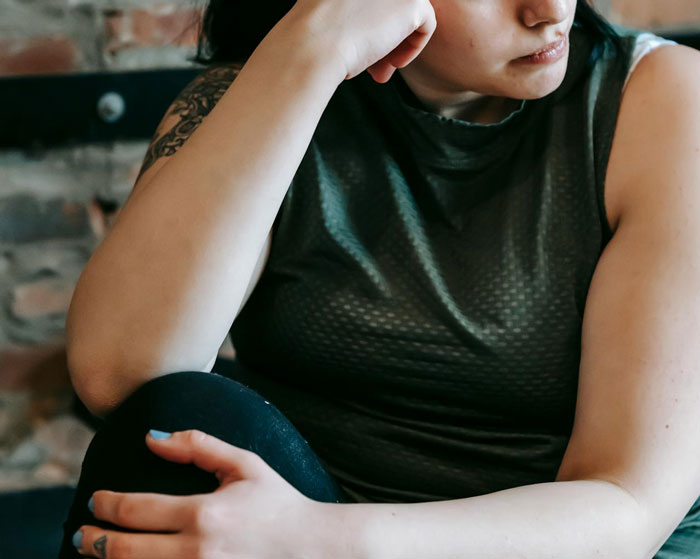
Image credits: Andres Ayrton / Pexels (not the actual photo)
Weight discrimination is extremely common and harmful
It may seem like plus size people have been getting much more representation in the media in recent years, which is wonderful, but the vast majority of people I see online and on my TV screen are still extremely thin. When I watch movies, I often notice how tiny all of the women onscreen are, and I can’t help but feel pressure to want to shrink myself down to the same size.
And because we’ve been conditioned to believe that these small bodies are the norm, many people have subconsciously adopted fatphobic ideology. According to Within Health, fatphobia is “an implicit bias of overweight individuals,” which is “often rooted in the misguided idea that attaining a thin or fit body type is the ultimate life goal, and presenting as overweight is a sign of moral failing.”
It also seems to have only gotten worse with recent health initiatives geared towards battling obesity. In fact, one study found that discrimination based on weight increased by two thirds between 2011 and 2021. One of the reasons why fatphobia is so common is because it’s often seen as one of the only types of discrimination that’s considered socially acceptable.
Just like any other form of prejudice, judging others for their weight can have long-lasting effects. Within Health notes that weight bias can cause or exacerbate depression, poor body image, low self-esteem, psychological stress, body dissatisfaction and substance abuse. Not to mention all of the frustrating double standards that fat individuals have to deal with on a daily basis, which Michelle addressed in her videos.
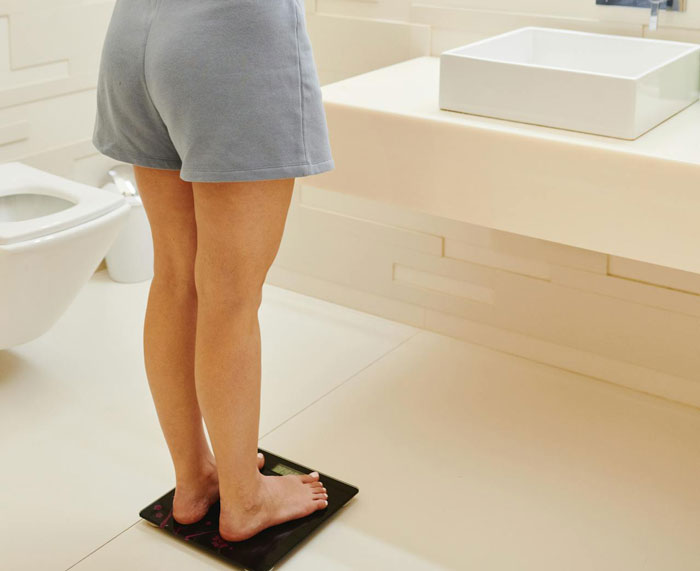
Image credits: Matilda Wormwood / Pexels (not the actual photo)
Over two thirds of adults in the United States are overweight
But the reality is that being in a fat body is extremely normal nowadays. In fact, in certain parts of the world, it’s even more common than being thin. According to the World Health Organization, about 16% of adults around the world were obese in 2022, while 43% of adults were overweight. At the same time, about 390 million kids and teens between the ages of 5-19 were overweight.
In the United States, Healthline reports that about 42% of adults are obese, and 30.7% of adults are overweight. While it’s understandable for people to want to lose weight or get into better shape to increase their overall health, there’s absolutely no reason to shame people for how their bodies look. In fact, it’s well known that shame is not an effective motivator in getting people to lose weight. One study actually found that obese individuals who report experiencing weight discrimination are actually 3.2 times more likely to remain obese.
I was always taught that if I didn’t have anything nice to say, I shouldn’t say anything at all. And it’s so easy for fatphobic individuals to keep their mouths shut when they think of hurtful comments. But if we really want to eradicate weight discrimination, we should be talking about it and calling it out.
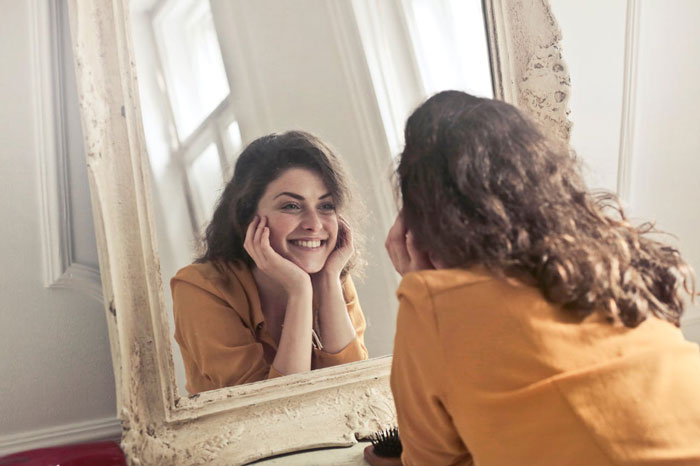
Image credits: Andrea Piacquadio / Pexels (not the actual photo)
Everyone deserves to love their body and feel comfortable in their own skin
The Butterfly Foundation notes that it’s important to push back against diet culture, no matter what size you are, because you may be contributing to it without even realizing. Know that your body is not a problem that needs to be solved, and accept that it’s beautiful just the way it is. If you want to reduce your own weight bias, one great way to do so is by diversifying your feed.
If all you see on Instagram is skinny models and thin influencers, you’re probably going to start to believe that’s what everyone should look like. Follow creators of all different body types, races, gender expressions, etc. to remind yourself how unique humans truly are. Remember to challenge fatphobic thoughts that creep up in your own head as well. No, you don’t need to “run off” that piece of cake you ate, and you don’t need to “suck in” when you take photos.
Try to stop worrying so much about how your body looks. Accept it for how it is and be grateful for all that it can do. And of course, call out friends and family members who perpetuate diet culture or spread fatphobia.
We would love to hear your thoughts on Michelle’s videos in the comments below, pandas. Have you ever experienced similar fatphobia in your own life? Feel free to share, and then check out this Bored Panda piece discussing similar themes!
Viewers found Michelle’s videos very relatable, and some chimed in with things they’re “not allowed” to do either
